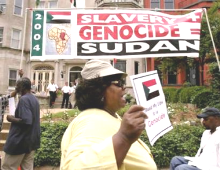Sudan says internal politics drives US over Darfur
By Nima Elbagir
KHARTOUM, Sept 4 (Reuters) – Sudan said on Saturday the United States was wrong to try to label the conflict in Darfur as genocide and said recent hardline U.S. statements on Sudan were aimed at domestic constituencies and the U.S. elections.
 “As long as elections are going on, and as long as both parties are competing for the votes of the African-Americans you should not expect a neutral or fair position to the situation in Darfur,” Foreign Minister Mustafa Osman Ismail told reporters.
“As long as elections are going on, and as long as both parties are competing for the votes of the African-Americans you should not expect a neutral or fair position to the situation in Darfur,” Foreign Minister Mustafa Osman Ismail told reporters.
The United States criticised the United Nations this week for being soft on Sudan after a U.N. envoy said Khartoum had taken some steps under the threat of possible sanctions to comply with a demand to increase security in Darfur.
The United Nations did not call for sanctions. Instead U.N. envoy for Sudan Jan Pronk proposed a wider mandate for African Union monitors to help stop abuses in Darfur.
U.S. ambassador to the United Nations John Danforth, a former U.S. special envoy to Sudan, reacted quickly, saying: “The fact of the matter is that the government of Sudan has been directly involved in attacks on villages.”
The European Union revived the notion of sanctions on Saturday, while U.S. officials have said they want to ratchet up the pressure on Sudan to stop the violence but have played down the idea of sanctions.
On Friday, the United States said it was preparing a new U.N. resolution on Darfur and said Secretary of State Colin Powell might, in Senate testimony on Thursday, address the question of whether the violence in western Sudan constituted genocide.
“We’re preparing a further U.N. resolution, looking at what goes into that. We expect we’ll be talking to other governments shortly,” said State Department spokesman Richard Boucher.
The U.S. Congress has already labelled the conflict genocide but the administration of President George W. Bush has not taken that step.
SUDAN DISMISSES CRITICISM
The government in Khartoum dismissed U.S. criticism.
“Its (U.S.) decisions are influenced by internal factors whether they be pressure groups or the pending elections. (U.S.) Congress’ stance on genocide is and remains a solitary one … because it (genocide) is simply not happening,” Ismail said.
“We are open, we are ready for cooperation. You (America) should give us a chance. You shouldn’t push for confrontation,” the Sudanese minister said, adding sanctions would not help.
Ismail said he planned to speak to Powell later on Saturday to explain the current situation in Darfur.
The conflict erupted in Darfur in February 2003 when rebels took up arms against Khartoum after years of low-level clashes between African farmers and Arab nomads over scarce resources.
The United Nations says fighting has killed up to 50,000 people and created the world’s worst humanitarian crisis.
Sharif Harir, negotiator for the rebel Sudanese Liberation Movement (SLM), said he welcomed the tough U.S. language.
“That kind of international pressure will have some influence on the attitude of the Sudanese government and the future of the talks,” Harir said at peace talks in Abuja between the government and rebels.
The talks, under way for nearly two weeks, were adjourned on Saturday until Sunday afternoon to allow both parties to consider an African Union draft compromise proposal on security.
Rebels have long accused Khartoum of a campaign of genocide, saying the government armed the Arab Janjaweed militias to loot and burn African villages. Khartoum dismisses the genocide charge and denies backing the Janjaweed, calling them outlaws.
An SLM rebel delegate leaving the end of talks on Saturday said a fresh attack took place on Friday on villagers in Sayah, 90 km (60 miles) north of the Darfur capital el-Fasher, the latest in a series of accusations of ceasefire violations.
He said the attack took place while African Union ceasefire monitors were present in the village. The African Union was not immediately available for comment.
Dutch Foreign Minister Bernard Bot said the European Union would draw up sanctions against Sudan, with a view to implementing them if the United Nations calls for such measures.
“We certainly do not exclude sanctions at some point in time,” Bernard Bot, whose country holds the rotating EU presidency, told a news conference.
Ismail said Sudan was not against increasing the number of African monitors in Sudan, but said Sudanese forces should remain responsible for security in the region so that the monitors did not become caught up in the conflict.
“We should not give the impression that we are against the presence of the Africans. What we are saying is that Darfur is full of weapons … So keeping of security, direct security, should be the responsibility of the Sudanese forces,” he said.
(Additional reporting by Tume Ahemba in Abuja and Sebastian Alison in the Netherlands)
